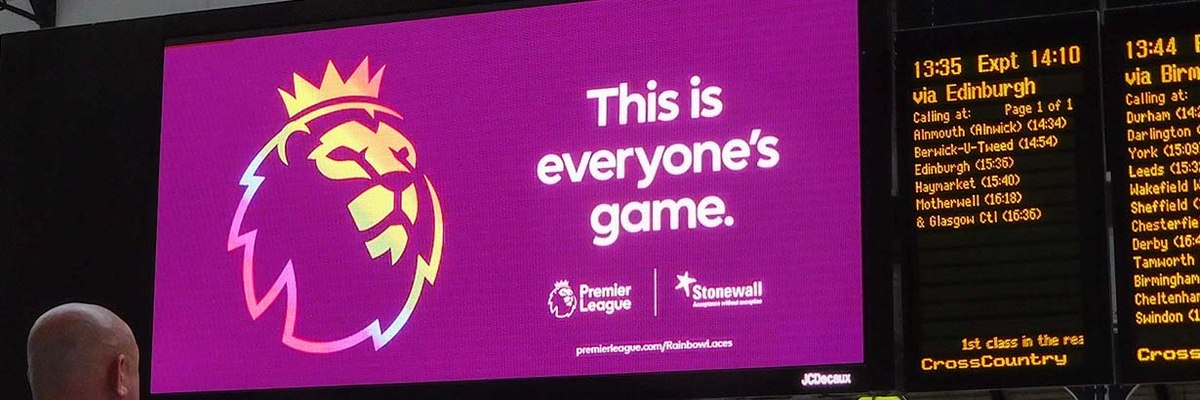Fans, and the wider public, expect gay footballers to receive a warm welcome from their teams and supporters, but are more worried about the behaviour of opposing fans
Last week Jake Daniels became the first active male professional footballer to come out as gay since the 1990s. The 17 year old Blackpool forward’s decision was reported to have been months in the making, with Daniels citing Australian professional footballer Josh Cavallo, non-league player-manager Matt Morton, and diver Tom Daley as inspirations for his move.
Following Daniels’ decision, a new YouGov survey examines the perceptions of football fans, as well as the wider public, on the issue of homophobia in professional football.
Half of Britons and football fans consider homophobia to be a serious problem in professional football
Out of five forms of intolerance YouGov asked about, Britons are mostly likely to see racism as a serious in professional football in the UK. Six in ten Britons (60%) and two thirds of football fans (68%) say that racism is a “very” or “fairly” serious problem in the game today.
Homophobia comes second, with half of Britons and fans seeing it as a serious problem (51-52%).
Nevertheless, half of football fans (48%) believe that the situation regarding homophobia in professional football is better today than it was 10 years ago. Similar numbers say the same of racism (51%) and sexism (54%).
Among those fans who currently see as a serious problem in the game, 42% say the situation has improved in the last decade. One in seven (14%) believe homophobia has become more of a problem in professional football in the ten years.
In fact, the results show that fans who see racial and religious discrimination as a serious problem in football today are notably more likely to think things have been getting worse: 25% say this of racism and antisemitism, and 34% do so for Islamophobia.
Most fans are aware of campaigns against homophobia in football, but anti-racism campaigning is far more prominent
While most football fans have noticed efforts by authorities and campaigners to tackle discrimination across the sport, the efforts to tackle racism have garnered far more attention than those for other issues.
The majority of football fans (57%) say they’ve noticed “a lot” of campaigning aimed at tackling racism in professional football in the last year, with the Premier League prominently promoting its No Room for Racism campaign. Overall, 86% of fans say they’ve noticed at least some campaigning on this issue.
By contrast, only 16% of fans think they’ve seen a lot of campaigning against homophobia in the sport, although close to two thirds (65%) say they have seen at least some. The Premier League has supported Stonewall’s ‘Rainbow Laces’ campaign, while the FA’s chosen campaign is Football v Homophobia.
Other issues have garnered less attention still, with only 31% of fans having noticed any campaigning against Islamophobia in the sport, the lowest of the seven issues we asked about.
Britons expect a warm reception for gay players from their teams and the wider public, but not from opposing fans
Jake Daniels expressed hope that his decision to come out publicly would help others to do so as well. The public seem to expect he will get his wish, with most Britons (57%) and football fans (61%) thinking it is likely that the next 12 months will see further male professional footballers going public about being gay.
Should other players follow in the Blackpool striker’s footsteps, both football fans and the wider public alike expect they will receive at least a “mostly positive” reaction from their teammates, their team’s fans, and the wider public.
They are more sceptical about the behaviour of fans from other teams, however. By 39% to 32%, football fans believe that the reaction of opposing fans to players coming out will be negative rather than positive. The public likewise tend to expect negativity rather than positivity by 35% to 20%.
Indeed, when asked what people think is most responsible for why footballers who are out to their friends and family choose not to go public with their sexuality, the reaction from opposing fans tops the list. Most football fans (57%) believe this to be the case, as do 42% of the wider public.
The potential reaction of the media comes a distant second among football fans (35%), with 38% of the public saying the same.
Neither group is more likely to think closeted footballers are worried about the reaction from players at other teams than they are their own teammates (25% vs 23% among football fans, and 19% vs 22% among the public).













